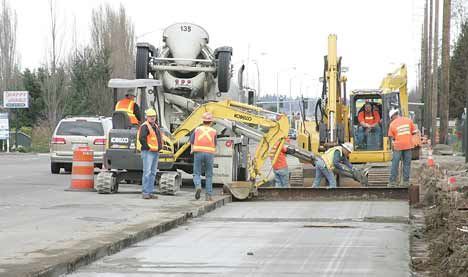Kent vehicle owners might be charged an annual $10 to $20 vehicle license registration fee as the City Council tries to come up with new ways to fund city street projects.
Council members indicated strong support for a vehicle license fee at a May 4 workshop with city staff and consultants about how to fund an estimated $595 million of transportation projects over the next 25 years, including $137 million of street-railroad grade separation projects.
The Council also wants to look at implementing transportation impact fees on new developments and possibly a business license fee that would charge each company so much money per employee.
The Council plans to discuss the proposed fees, including more specific details about transportation impact and business license fees, at another workshop at a date to be determined in June. They could have a formal proposal by fall.
“I think a vehicle license fee is a go,” said Councilwoman Deborah Ranniger at the workshop. “The rest (of the funds) will come from an impact fee, a business license fee or some combination of the two.”
The state Legislature passed a law in 2007 that allows a city or county government to create local transportation benefit districts and impose a local vehicle registration fee to fund transportation projects.
The Council can adopt the fee without voter approval by keeping the cost at $20 or less. Voters would need to approve any fee higher than $20 with a ceiling of $100 per vehicle.
“The vehicle license fee appeals to me because you can allocate a portion of the money to a street fund so we can do other projects (in addition to street-railroad grade separations),” Councilman Dennis Higgins said.
A $10 vehicle license fee would raise just more than $1 million per year for the city or an estimated $28 million over 25 years of street projects. A $20 fee would jump those numbers to more than $2 million per year and $56 million over 25 years.
The cities of Des Moines, Edmonds, Lake Forest Park, Olympia, Prosser and Shoreline have adopted $20 vehicle tab fees over the last couple of years to pay for street projects, according to the state Department of Licensing.
“I agree with Dennis that a vehicle license fee makes sense as a user fee for driving on the roads,” Council President Jamie Perry said.
City officials want to construct street-railroad grade separation projects over the next several years along South 228th Street, South 212th Street and Willis Street at a cost of about $137 million. The projects eliminate drivers having to wait for trains as the streets will go either over or under the railroad tracks.
So far, the city has about $32 million lined up for the street-railroad projects with funding from the Washington State Freight Mobility Strategic Investment Board, Burlington Northern Santa Fe Railway, Union Pacific Railroad, the Port of Seattle, the Washington State Public Works Trust Fund and the federal government.
That leaves a gap of about $105 million for the city to fill.
The Council discussed transportation impact fees last year. Developers would have to pay a fee of so much per new house or so much per square foot for a new commercial building, based on the number of new peak-hour vehicle trips generated by the project.
Council members backed off from any formal proposal for a transportation impact fee after a negative reaction from the local business community. But now at least a few Council members want to revive the proposal.
“I think an impact fee is something we need to take a very strong look at,” Perry said.
Kent has worked with other funding partners to complete street-railroad separation projects over the last nine years along South 196th Street, South 277th Street, South 180th Street and South 228th Street.
But federal and state funds that helped cover the costs of those projects are not as available because of budget cutbacks at the federal and state levels.
“The 80 percent federal cost share days are gone,” said Doug Levy, who contracts with the city to lobby state and federal officials, at the workshop. “You need to look at tools to be self-sufficient. But these are tough policy calls.”
Perry said the Council needs to decide what fees to charge to pay for transportation projects.
“My hope is that we are moving forward on something,” Perry said. “I don’t want to sit another year and not take action.”
Tim LaPorte, city public works director, told the Council it needs to come up with a funding plan for the street-railroad grade separation projects by this fall in order to stay lined up to get funds from the state Freight Mobility Strategic Investment Board. He said the board has pulled funds from other cities that did not have funding plans in place.
“We will be more successful for state and federal grants if we have other funds in place,” LaPorte said.
Talk to us
Please share your story tips by emailing editor@kentreporter.com.
To share your opinion for publication, submit a letter through our website https://www.kentreporter.com/submit-letter/. Include your name, address and daytime phone number. (We’ll only publish your name and hometown.) Please keep letters to 300 words or less.

